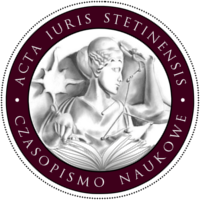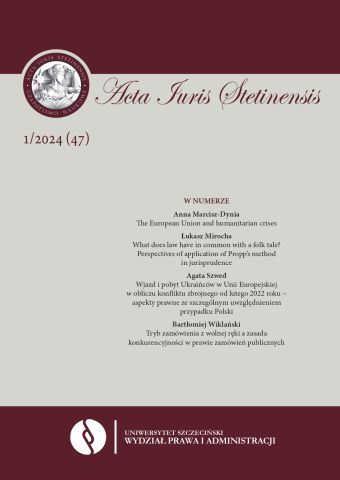






| Authors: |
Łukasz
Mirocha

Pomeranian University in Słupsk |
| Keywords: | theory of law law and literature narratology Vladimir Propp Morphology of the Folktale |
| Data publikacji całości: | 2024-03 |
| Page range: | 16 (77-92) |
| Downloads ?: | 49 |
| 1. | Andruszkiewicz M., Interpretacja prawnicza a interpretacja literacka – kilka uwag, “Krytyka Prawa” 2014, Vol. 6. |
| 2. | Andruszkiewicz M., Prawo w literaturze (Law in Literature). O stosowalności literackiej analizy prawa w prawoznawstwie, in: D. Kondratczyk-Przybylska, A. Niewiadomski, E. Walewska (eds.), Język prawny i prawniczy: I Kongres ogólnopolski, Warsaw 2017. |
| 3. | Andruszkiewicz M., Transdyscyplinarne związki prawoznawstwa z naukami o języku. Od języków formalnych do nurtu “prawo i literatura”, in: M. Król, A. Bartczak, M. Zalewska (eds.), Integracja zewnętrzna i wewnętrzna nauk prawnych, part 2, Łódź 2014. |
| 4. | Baron J.B., Epstein J., Is Law Narrative?, “Buffalo Law Review” 1997, vol. 45. |
| 5. | Burzyńska A., Markowski M.P., Teorie literatury XX wieku. Podręcznik, Kraków 2006. |
| 6. | Conti D.B., Narrative Theory and the Lain: A Rhetorician’s Invitation to the Legal Academy, “Duquesne Law Review” 2001, Vol. 39(2). |
| 7. | Farber D.A., Sherry S., Telling Stories Out of School: An Essay on Legal Narratives, “Stanford Law Review” 1993, Vol. 45. |
| 8. | Godzich W., Od narratologii akcji do narratologii decyzji, “Teksty Drugie” 1990, No. 2. |
| 9. | Grose C., Johnson M.E., Branding the Strands of Narrative and Critical Reflection with Critical Theory and Lawyering Practice, “Clinical Law Review” 2019, Vol. 26. |
| 10. | Hardy S., Narrative Theory, Psychology and Law, “Australian Journal of Law and Society” 2000-2001, Vol. 15. |
| 11. | Johnston J., Breit R., Constructing Legal Narratives: Law, Language and the Media, ANZCA Communication, Creativity and Global Citizenship 2009. |
| 12. | Kennedy D., Critical Theory, Structuralism and Contemporary Legal Scholarship, “New England Law Review” 1986, Vol. 21. |
| 13. | Lahlou K., An Attempt at Applying Vladimir Propp’s Morphology of the Folktale on Charles Dickens’s Great Expectations, “Arab World English Journal for Translation & Literary Studies” 2017, Vol. 1(3). |
| 14. | Martinez G.A., Philosophical Considerations and the Use of Narrative in Law, “Rutgers Law Journal” 1999, Vol. 30. |
| 15. | Meister J.Ch., Narratology, 19 January 2014, The Living Handbook of Narratology, https://www-archiv.fdm.uni-hamburg.de/lhn/node/48.html. |
| 16. | Mirocha Ł., Law and literature jako niedoceniony nurt jurysprudencji, “Societas et Ius” 2013, No. 1(2). |
| 17. | Mirocha Ł., Narracja w prawie? Drogi recepcji pojęcia, in: M. Zirk-Sadowski, B. Wojciechowski, T. Bekrycht (eds.), Integracja zewnętrzna i wewnętrzna nauk prawnych, part 1, Łódź 2014. |
| 18. | Młynarska-Sobaczewska A., Narracyjność w aktach stosowania prawa, “Państwo i Prawo” 2014, No. 12. |
| 19. | Morawski L., Główne problemy współczesnej filozofii prawa. Prawo w toku przemian, Warsaw 2005. |
| 20. | Morawski L., Wstęp do prawoznawstwa, Toruń 2011. |
| 21. | Olson G., Narration and Narrative in Legal Discourse, 31 May 2014, The Living Handbook of Narratology, https://www-archiv.fdm.uni-hamburg.de/lhn/node/113.html. |
| 22. | Plutarch, Żywoty równoległe – wyjątki z żywotu Likurga, in: B. Lesiński, J. Walachowicz (eds.), Historia ustroju państwa w tekstach źródłowych, Warsaw/Poznań 1992. |
| 23. | Posner R.A., Legal Narratology, “The University of Chicago Law Review” 1997, Vol. 64. |
| 24. | Potrzeszcz J., Uniwersalna gramatyka moralności i prawa, “Forum Prawnicze” 2011, No. 4–5. |
| 25. | Propp W., Morfologia bajki, transl. W. Wojtyga-Zagórska, Warsaw 1976. |
| 26. | Skuczyński P., Narracyjność języka prawniczego w procesie tworzenia prawa, “Archiwum Filozfii Prawa i Filozofii Społecznej” 2020, No. 1. |
| 27. | Smejkalova T., Story-Telling in Judicial Discourse, “Comparative Legilinguistics” 2011, No. 5. |
| 28. | Spengler O., Zmierzch Zachodu. Zarys morfologii historii powszechnej, trans. J. Marzęcki, Warsaw 2014. |
| 29. | Stawecki T., Winczorek P., Wstęp do prawoznawstwa, Warsaw 1999. |
| 30. | Stern S., Narrative in the Legal Text: Judicial Opinions and Their Narratives, in: M. Hanne, R. Weisberg (eds.), Narrative and Metaphor in Law, Cambridge 2018. |
| 31. | Wellek R., Warren A., Teoria literatury, trans. Maciej Żurowski, Warsaw 1976. |
| 32. | West R., Jurisprudence as Narrative: An Aesthetic Analysis of Modern Legal Theory, “New York University Law Review” 1985, Vol. 60. |
| 33. | Wolny K., Teoria literatury. Zarys problematyki, Rzeszów 1995. |